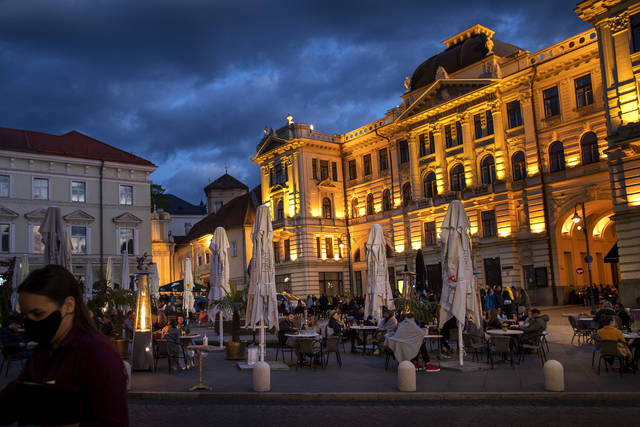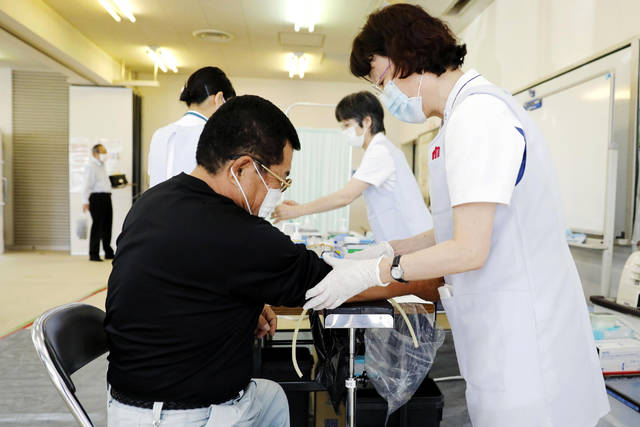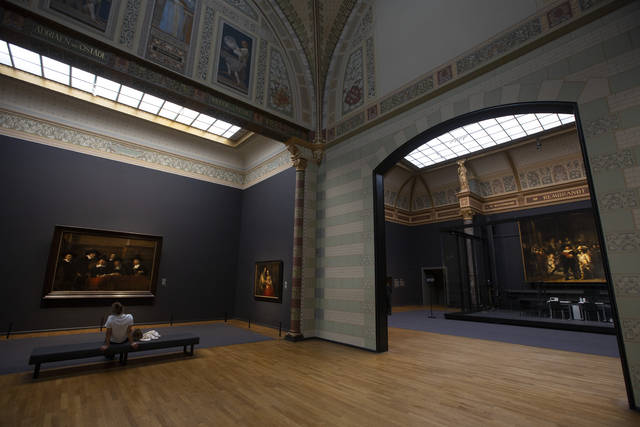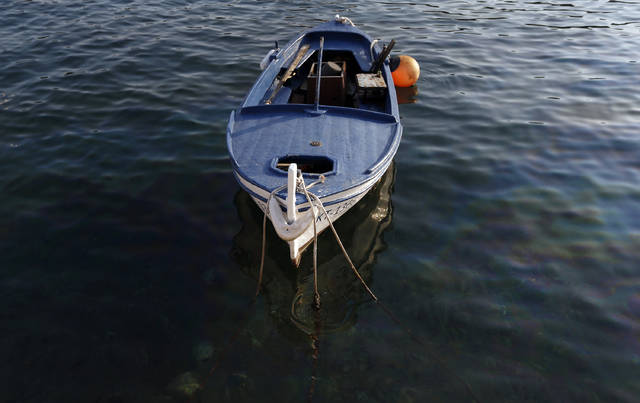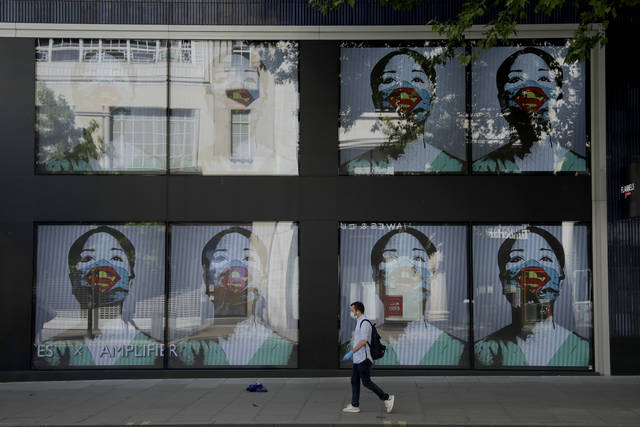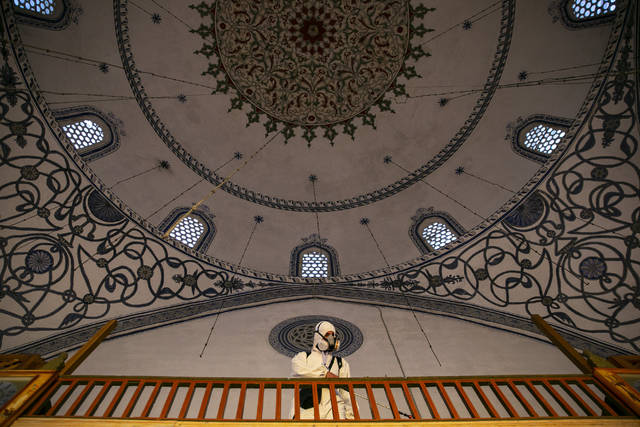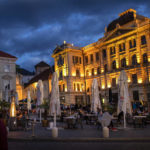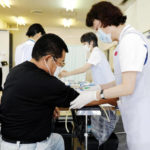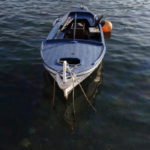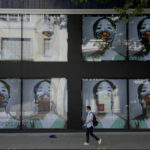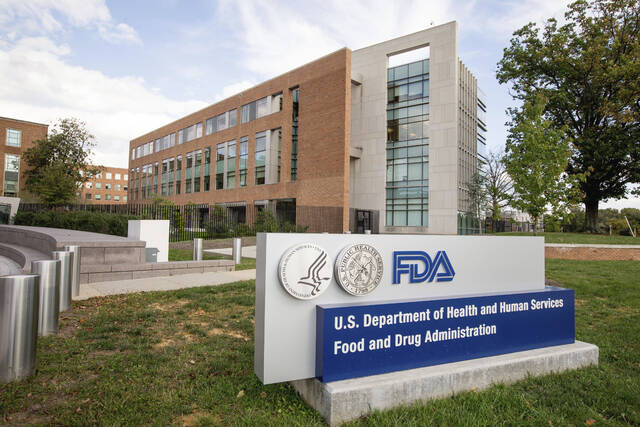Here’s the latest news on the coronavirus pandemic from around the world. Covid-19 causes mild or moderate symptoms for most people. For some, especially older adults and people with existing health problems, it can cause more severe illness or death.
From Amsterdam
In the Netherlands, some of the most beloved museums in the world reopened to the public, with Rembrandt’s The Night Watch and Van Gogh’s Sunflowers back on show.
And out of gratitude, visitors to the Van Gogh museum even received a real sunflower upon their departure. At the Mauritshuis in the Hague, the gaze of Vermeer’s Girl with the Pearl was also enticing visitors to come back.
All such treasures had been hidden from the public for over two months as the nations was forced into lockdown measures for the coronavirus.
At the most famous institution, the Rijksmuseum, visitors even got to hear that the blockbuster show “aravaggio-Bernini. Baroque in Rome” was being extended until September.
Museums all over the world have been struggling to get through the pandemic crisis and UNESCO has said that one in eight might have to close their doors for good. Some of the major institutions in Europe have been losing over $2.2 million a month.
From Spain
MADRID — Spain’s national statistics office said that it received zero international tourists in April after the nation had closed its borders at the height of its coronavirus outbreak.
In April 2019, 7 million tourists spent $7.8 billion in Spain.
Spain is waiting until July to reopen its border for foreign tourists. In the meantime, authorities are encouraging Spaniards to vacation inside at home.
Tourism is a pillar of Spain’s economy. Eighty million annual visitors generate 12% of Spain’s gross domestic product and help employ 2.6 million people.
Amid the global economic slowdown provoked by the pandemic, Spain’s government forecasts its economy will shrink by 9% and unemployment to reach 19% this year.
From Montenegro
PODGORICA, Montenegro — Montenegro, the first country in Europe to declare itself “coronavirus-free,” has started letting in foreign tourists as of Monday as it seeks to salvage the tourism season following the virus outbreak. But there’s a catch.
The tiny Adriatic state’s authorities have listed 131 countries whose citizens can enter without any restrictions, if they currently have at most 25 active covid-19 cases per 100,000 people.
Nevertheless, Montenegro’s government tweeted Monday that “tourists mostly from Western European countries started arriving as of midnight.”
In a bid to attract wary European tourists looking for a safe place to spend their holidays, Montenegro has been advertising itself as a “corona-free” destination since it officially has had no new cases of covid-19 infections for the past several weeks.
From United Kingdom
LONDON — The World Health Organization says that about half of countries surveyed in a new analysis have had partial or complete disruption of services for people with high blood pressure and diabetes treatment during the ongoing coronavirus pandemic.
In a survey of 155 countries last month, the U.N. health agency found worrying problems in the provision of health care for people with non-communicable diseases, many of whom are at higher risk of severe complications from covid-19.
“Many people who need treatment for diseases like cancer, cardiovascular disease and diabetes have not been receiving the health services and medicines they need since the covid-19 pandemic began,” WHO director-general Tedros Adhanom Ghebreyesus said in a statement. “It’s vital that countries find innovative ways to ensure that essential services…continue even as they fight covid-19.”
The survey also found that 42% of countries had interrupted services for cancer patients and 31% for heart emergencies. In more than 90% of countries, health care staff had been partially or fully reassigned to pandemic duties.
From Japan
TOKYO — Japan’s health ministry started blood tests Monday in three areas including Tokyo in an effort to check what percentage of its people have developed antibodies, a sign of their coronavirus infections in recent past.
The tests will be conducted on 10,000 randomly selected people at age 20 or older from Tokyo and Osaka to represent Japan’s two most-infected prefectures, while Miyagi in the north is one of least infected in the country.
Some 3,000 people will be tested in each area and results will be expected at the end of June.
Japan, because of its lack of testing capability and resources, has until recently begun carefully limiting access to testing mainly to reduce the number of severe cases and fatalities. The strategy, however, has prompted doubts that many people may have been undetected.
From Lithuania
VILNIUS, Lithuania — Lithuania is easing border restrictions on foreign nationals arriving from dozens of European countries, the health ministry said on Monday.
A 14-day quarantine period will no longer be mandatory for those entering from European countries with less than 15 new confirmed coronavirus cases per 100,000 people over the last two weeks. This includes Germany, Poland, France, Italy, Finland, Norway, Denmark, Austria, Bulgaria, Croatia, Cyprus, the Czech Republic, Estonia, Greece, Hungary, Iceland, Latvia, Liechtenstein, Luxembourg, the Netherlands, Romania, Slovakia, Slovenia, and Switzerland.
Travelers coming from Ireland, Malta and Spain continue to face a 14-day self-isolation period while citizens of Belgium, Sweden, Portugal, and the UK — all exceeding 25 new cases per 100,000 population in the past 14 days — remain banned from entering the Baltic nation.
Earlier in May, restrictions were lifted for residents from neighboring Latvia and Estonia with the announcement of a Baltic travel bubble.
From Albania
TIRANA, Albania — Both Albania and Kosovo have allowed nearly all movement and operation of businesses on Monday except for a few activities that usually collect groups of people.
Land borders have opened, and incoming visitors are not obliged to self-quarantine themselves. A long line of vehicles was seen at some border crossing points and businesses at one of them were complaining about an added 22-euro tax ($24.4) for disinfection of their cargo vehicles.
People and businesses are free to move, including with vehicles.
Hotels in Albania also opened on Monday while public beaches will be free for the people a week later. Tourism is one of the most negatively impacted businesses, especially in Albania with a 300-mile (485-kilometer) seaside increasingly attracting international tourists.
From Portugal
LISBON, Portugal — Portugal is allowing movie theaters, shopping malls, gymnasiums and kindergartens to reopen from Monday, but the capital Lisbon isn’t seeing all those restrictions lifted because some hot spots of the new coronavirus have emerged there.
On Sunday, officials reported that the Lisbon metropolitan area represented 268 of the country’s 297 new daily infections.
Health authorities say they are stepping up controls in some of Lisbon’s low-income zones, and especially at construction sites and for temporary workers regarded as most at risk.
There were few cars in Lisbon’s streets at the start of the week. The capital’s public transport was little used, and empty offices remained the norm even though working from home is no longer mandatory.
Lisbon shopping malls and mega stores must stay closed, and people can gather in groups of no more than 10 people, at least until a government review on June 4.
From Slovakia
BRATISLAVA, Slovakia — Slovakia is partially reopening its schools amid the government’s steps to ease the restrictive measures to stem the coronavirus pandemic.
Nursery schools are reopening on Monday while children up to the fifth grade (about 11 years old) can go back to schools on a voluntary basis but no more than 20 can be in one class.
Slovak President Zuzana Caputova, who visited a school in the town of Lozorno located north of Bratislava, said the online remote education had after all some benefits for all.
“It was a tough experience for all but at the end it resulted in some benefits, such as for the relations between the teachers and the students as well the teachers and the parents,” Caputova said.
Only 28 people have died of covid-19 in Slovakia, according to the government’s figures while about 1,500 tested positive for the coronavirus.
From Italy
ROME — A long line of masked visitors is snaking outside the Vatican Museums as one of Italy’s biggest tourist draws reopens after a three-month coronavirus shutdown.
Museum director Barbara Jatta popped out of the museum Monday and appeared to briefly greet visitors waiting on line, spaced apart, to have their temperatures taken before being allowed to tour the Sistine Chapel and other treasures.
Across town, Rome’s other big attraction — the Colosseum — also opened its ancient doors, but it appeared there were more television crews than tourists on hand.
Italy on Wednesday will further loosen travel restrictions in the onetime epicenter of Europe’s pandemic in a bid to reboot the tourism industry that accounts for some 13% of the national GDP.
Italians will be allowed to freely move about the country and European Union visitors will be welcomed without quarantine requirements.
From Russia
MOSCOW — The Russian capital has eased the restrictions intended to stem the coronavirus outbreak, allowing all non-food retailers and some other businesses to reopen.
Monday’s reopening of retail stores along with dry cleaners and repair shops comes as the pace of contagion has stabilized in the Russian capital that has accounted for about half of the nation’s infections. Residents are also allowed now to walk in the parks and engage in sports activities with time restrictions. Restaurants, cafes, hairdressers and gyms remain closed and people are still required to obtain electronic passes for traveling.
Most Russian regions have been in lockdown since late March, but many already have eased the restrictions to ease the economic pain.
Russia has registered nearly 415,000 infections, the world’s third-highest caseload behind the United States and Brazil. Some experts in Russia and abroad have voiced doubts about the nation’s relatively low death toll of 4,855, alleging that the authorities might have underreported coronavirus mortality for political reasons. Officials have rejected the claims.
From Netherlands
THE HAGUE, Netherlands — The Netherlands has taken a major step to relax the coronavirus lockdown, with bars, restaurants, cinemas and museums reopening under strict conditions.
The move happens on a major public holiday and with the sun out blazing, there were immediate fears for overcrowding like in popular beach resorts like Scheveningen close to The Hague.
Under the new rules, bars and restaurants will be allowed to cater to up to 30 patrons inside if they keep social distancing. There will be no standing room in the bars and reservations will be necessary. There are no crowd limits for terraces outside if distance is kept. Owners have been preparing for the move for weeks, after they missed out on over two months of income because of the crisis.
From Turkey
ANKARA, Turkey — Turkish Airlines resumed limited domestic flights, restaurants welcomed sit-in customers and beaches and museums reopened as Turkey’s broadest easing of coronavirus restrictions came into effect Monday.
A Turkish Airlines flight, with 156 people on board, departed from Ankara airport for Istanbul as Turkey lifted a travel ban between 15 of its worst-affected provinces. The air routes between Istanbul, Ankara, Izmir, Antalya and Trabzon are the first start, with others scheduled to follow gradually.
Traffic jams returned to Istanbul, Turkey’s most populous city, while intercity roads filled with people heading for hometowns or to resorts.
Meanwhile, restaurants and cafes opened their doors to a limited number of customers after some two months of takeout services only.
Istanbul’s 15th-century Grand Bazaar, museums, libraries, gyms, swimming pools, child care centers and nurseries were among other venues allowed to resume operations.
From Greece
ATHENS — Greece on Monday lifted lockdown measures for hotels, open-air cinemas, golf courses, and public swimming pools as the country ramped up preparations for the tourism season starting in two weeks.
Primary school children also returned to classes in the country where strict public safety measures were believed to have kept the covid-19 infection rate low, with the death toll at 175, according to Health Ministry figures announced Sunday.
International flights with relaxed screening procedures will resume to Athens and Greece’s second-largest city Thessaloniki starting June 15 and expanding to the rest of the country on July 1.
Screening for arriving passengers will be based on an assessment by a European Union flight safety authority, with arrivals from low-infection countries being subjected only to random testing.
Hotels with a 12-month operating license were allowed to reopen Monday but many chose to remain closed until closer to the start of the tourism season, citing low bookings.
Also allowed to restart Monday are campsites, wedding reception services, tattoo parlors, and dating agencies.


